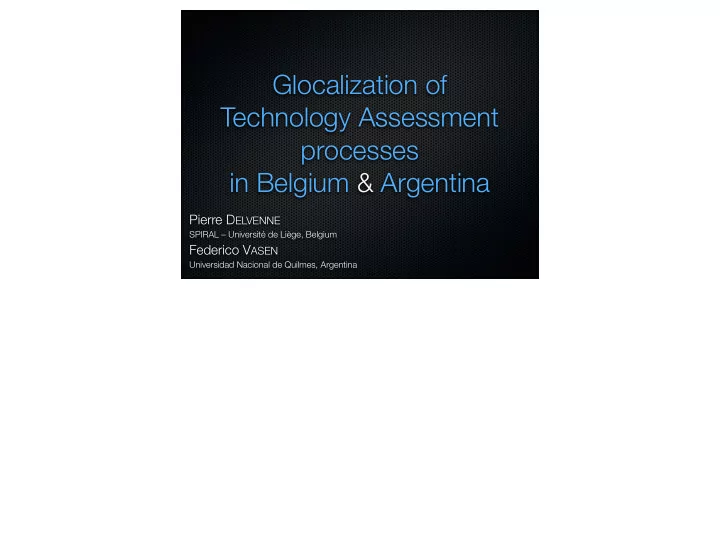

Glocalization of Technology Assessment processes in Belgium & Argentina Pierre D ELVENNE SPIRAL – Université de Liège, Belgium Federico V ASEN Universidad Nacional de Quilmes, Argentina
Introduction • STS approach (ongoing and recent collaboration) • TA as a prism to look at different contexts • Comparative analysis of (southern) Belgium and Argentina where there is no TA (yet) • Contrasted cases (EU/LA)
The glocalization of S & T policies • Globalization of S & T policies… • … While there is an embeddedness in local contexts GLOCAL (Asche, 2000) • Risk society (Beck, 1992) and side effects of S & T • Need to bridge the gap between S & T and politics and society; TA is one example.
Technology Assessment as an instrument of governance of S & T • Born in the US (1972), then extended to the EU (1980’s onwards) • Considerable variation from one (political, institutional, cultural, historical) context to another • Fit with the context = Only valuable crusade for TA
(P)TA = product or process? (Van Eijndhoven 1997) • Product: expert-based policy advice • Process: social assessment (ELSA + involvement of social actors) • European context contains both types • Latin American context can draw on both or develop other ones
(Southern) Belgium • Already existing “TA history” • First reflection in 1988 (parliamentary) • One institutionalization between 1994 and 2002 (Science policy council) failure • What happened? • No demands from the clients + lack of entrepreneur • No internal analytic capacity • Science policy council is reactive
Reflections on the 2002 failure • TA is a fragile institution • A TA emerges within the political system • (at least) Two conditions to successfully implement a TA institution: • Political willingness (and support) • Modulation of science and innovation system • Applicable to Latin America?
Latin American context in the 1960s and 1970s • The period of social relevance in science policy (Elzinga & Jamison, 1995) in which TA emerged did not have the same characteristics in Latin America • Environmental, ethical and social consequences were not in the forefront • Keywords were instead “autonomy”, “liberation”, “development/dependence”, “industrialization” • Science and Technology as forces for development. • The quest for Technological Autonomy (Adler, 1987) • Latin American World Model
TA in Latin America • TA in developing countries is noted as a strategy for socioeconomic development. • UN Seminar on Technology Assessment for Development (1978 : Bangalore, India, organized by UNCTAD). • Stress on technological choices • No specific TA institutions were created in Latin American countries • TA functions in LA are not in charge of a single organization or department. • Science and Technology policy explicit orientation insists on positive aspects of S&T (National Innovation Systems) .
Who cares about negative effects of S & T in LA? • Environmental and other non-governmental organizations • Social movements • Open-pit mining with cyanide in Catamarca • Academia • Research projects / networks (Renanosoma - Brazil) • Governments? • The case of transgenic soy and Roundup (glyphosate) • Pulp mills conflict between Argentina and Uruguay
Public Participation in S & T • Not many experiences • Consensus conference in Chile on medical records (2003) • Workshop on social relevance of research at the University of Buenos Aires (2003) • MERCOSUR’s Civil Society Council (ongoing) • Commissions: • Science and Technology • Climate Change & Sustainable Development • Natural Resources • Food Sovereignty
TA & Public Participation Possibilities for Latin America • From appropriate technologies to “tecnologia social” • Sociotechnical co-construction processes • Institutional framework for TA/participatory methods in S & T • University “extensión” as a expert/lay dialogue opportunity • Are there risk societies in LA?
Conclusions (1) • TA responding to risk society are limited to Europe (so far) • Southern Belgium: ongoing discussions, future of TA may emphasize the link between science and politics • Learning from the past: political willingness to involve, evolved science and innovation system (Prométhée program, networks of firms, competitiveness clusters) • Challenge = social concerns are (still) left behind
Conclusions (2) • Argentina: future of TA may emphasize the link between science and society • European TA diagnosis to implement TA is invalid: • Discursive ressources deployed against slowing down the progress, no political willingness to engage with scientists • Science and innovation system is not stabilized yet • A TA may emerge in the educational system • Challenge = keep connected to public policies
Thank you very much! Contact: pierre.delvenne@ulg.ac.be www.spiral.ulg.ac.be federico.vasen@gmx.net http://redonpat.ning.com
Recommend
More recommend